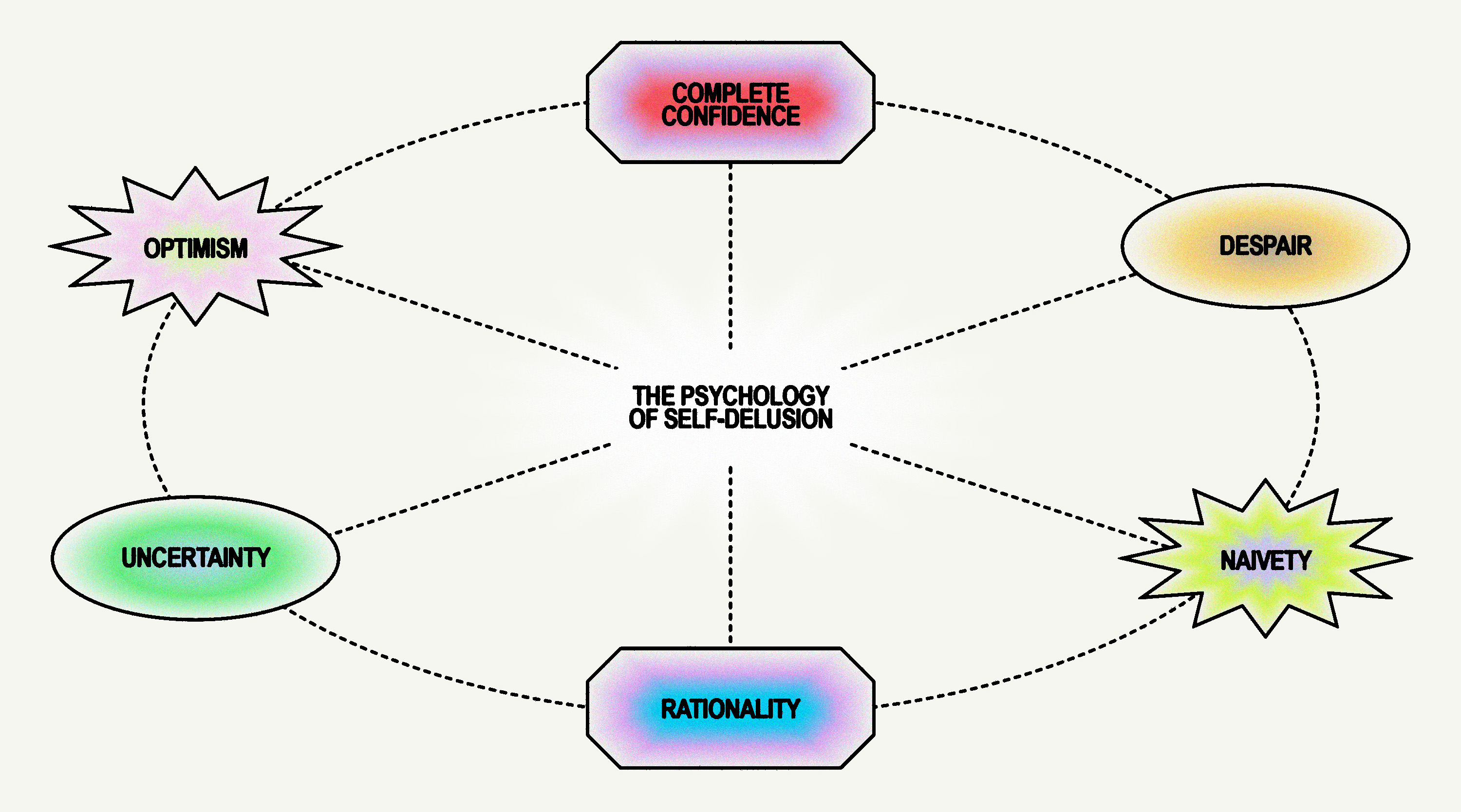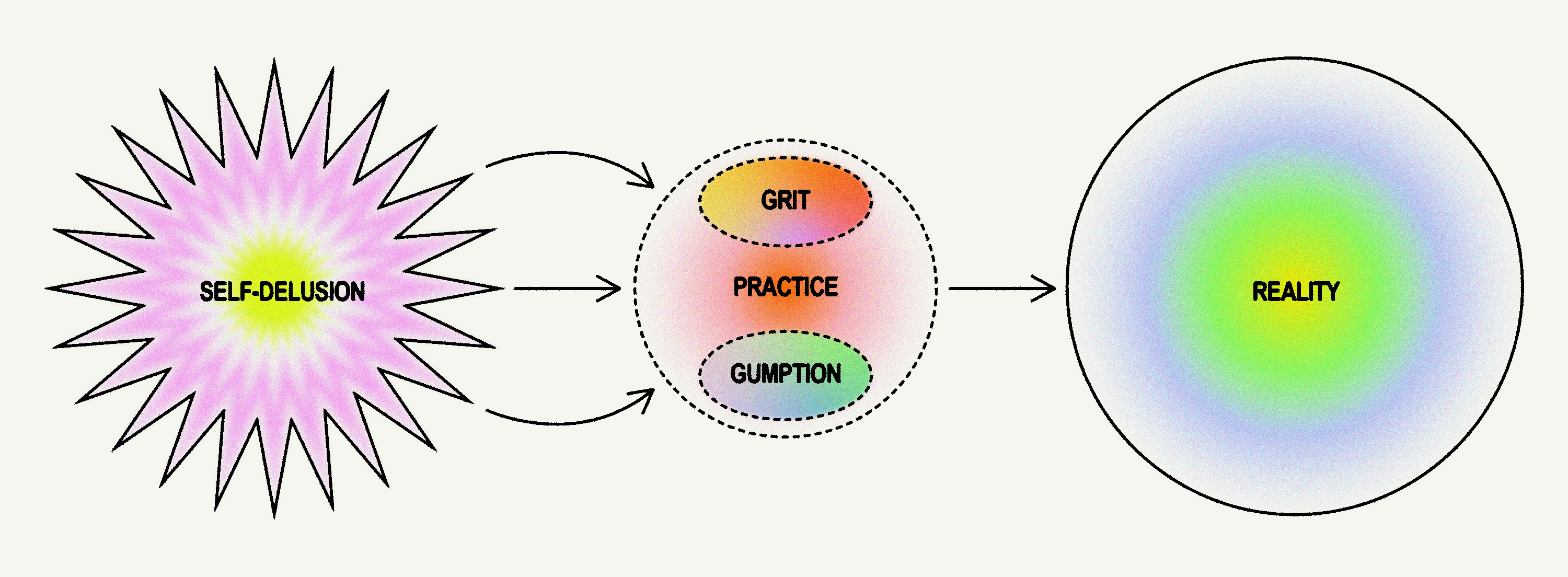What is it that motivates a person to write a book while working a full-time job, having multiple kids at home, and balancing all the other responsibilities of adulthood?
It’s simple: They deeply believe they can do it—even if they’re lying to themselves.
Their optimism, mixed with a healthy dose of naivety, concocts an unwavering faith in their abilities that motivates them to push against the world.
Imagine for a second if they were to be “real” with themselves.
They gather information on the saturated market, the failure rate of new authors, the chaotic nature of publishing, and the grueling labor of writing a book. They take a second look at their calendar and priorities. Oh, and they consult with their concerned partner. Any rational person wouldn’t attempt to write a book—at least, not right now.
In the same way that our hunter-gatherer ancestors charged into battle or went on hunts where they might be mauled or even killed, they lived to see another day because of an inflated belief in themselves. No room for doubt or overthinking. Their near-blind and delusional confidence became fuel for fast reflexes and, ultimately, their survival. Over time, they started amplifying their self-delusion with rituals like war paint, feasts, and battle drums before charging into another village or pack of buffalo. All in service of the story they tell themselves.
A creative life is no different.
The belief that you could build a new edge in the marketplace or create a body of work that challenges culture requires a tunnel vision that stops you from assessing reality clearly. People who are leading companies through a ruthless and unpredictable pandemic with optimism and unity, without a playbook or past experiences to reference for help, are fueled by self-delusion. They must believe they can do it, that things will get better, or else they have no fighting chance. How will they wake up in the morning and address their teams without sounding like they’re at a funeral? How will they motivate themselves to do the work when hope is difficult to grasp?
In so many areas in our lives—our health, or the responsibilities of a new job—keeping it real is preferred. I would rather my dentist be real with me about whether I need a root canal versus puffing up my self-delusion that I possess the power to manifest the problem away.
While self-delusion feels like an icky word, it is a necessary, vital function of our evolutionary hardwiring. In his book “You Are Now Less Dumb,” David McRaney explores 17 psychological phenomena that influence how we think, feel, and behave. In our mental machinery lies a cluster of biases, what psychologists call the self-enhancement bias.
It is exactly how it sounds: a bias which enhances your narrative, your thinking, and your behavior in a favorable light.
According to McRaney, self-enhancement bias allows us to maintain our happiness. He writes:
“Your wildly inaccurate self-evaluations get you through rough times and help motivate you when times are good. [Research shows] that people who are brutally honest with themselves are not as happy day to day as people with unrealistic assumptions about their abilities.”

Your body won’t allow you to hold your breath until you faint because self-preservation is hardwired into your system.
Similarly, our psyche won’t allow us to dwell on our failures or disappointments for too long, so we convert them into “life lessons” or traverse the windy path of self-justification—or you write a book.
You are the story you tell yourself
If you believe that you have no chance of being a writer, a designer, or an entrepreneur because none of the dots in your past add up, then of course you have no real shot at being one. The story you tell yourself either opens doors or closes doors.
Great teachers/mentors/friends make every door a glimmering opportunity to try, to learn, to figure out what you have inside of you.
Take me, for example.
I was an athlete and gamer for most of my early life who got in trouble on every first day of school because I never did my summer reading. I graduated high school with a 1.9 GPA and college with a 2.1 GPA. There were 420 students in my graduating senior class; I was ranked #400.
Then one day, in one of my life’s lowest lows, a friend suggested that I try blogging. Out of all things, I thought. His reasoning was urgent and simple: “Just do something.” He knew the healing powers of writing and journaling, but he wanted me to figure that out for myself. He paid for a yearly subscription and built me a simple website. I wrote about video games, food, movies, hobbies, and culture.
Did I publish every day? Nope. I cranked out 1,000 words of flaming garbage and hid it as a draft. In 10 years of writing, I have more hidden drafts than published stories. My parents were concerned; my friends thought it was a hobby. No one took me seriously because who I sought to become had no correlation with my past. Not even a hint.
But in that room that I grew up in for over 20 years, in the universe of my own mind, I was learning every day. I was mesmerized by language as if I were a newborn hearing my own voice for the first time. I would wake up with stories to get out of my head. Writing invariably encouraged a supplemental, life-enriching habit: reading books. I devoured subjects that were beyond my comfort zone, like physics, philosophy, psychology, history, and strategy. It felt like I was putting my brain and my soul through much-needed bootcamp and therapy.
“Great teachers/mentors/friends make every door a glimmering opportunity to try, to learn, to figure out what you have inside of you.”
During my junior year at college, I aimed to get straight Cs after realizing the path of writing was the life I wanted to lead over a degree in psychology. I devised how many tests and assignments I had to complete just to barely pass. I skipped class to read books in the library. I self-published two books and wrote for dozens of publications. I read over 100 books that year. I read about other writers’ lives. I learned that I wasn’t alone, that my problems weren’t special or unique. In fact, I felt like I was inducted into a secret club of writers who started their careers at the worst point in their lives. I’ve learned that they, too, harbored self-delusions to keep going—that’s how they made it.
In Meredith Moran’s book, Why We Write, she interviews writers on one question: why write?
Michael Lewis responded, “A lot of my best decisions were made in a state of self-delusion. When you’re trying to create a career as a writer, a little delusional thinking goes a long way.”
The only thing that could cast a larger shadow than my self-doubts were my self-delusions. On paper, I should have chosen a different path. Every writer—I might even go as far as every person trying to build a creative life—requires self-delusion. To play the long game, you have to keep your spirits up. Every blank draft felt like charging into a pack of buffalo. At the end of the day, all you have is the story you tell yourself and the self-discipline to commit to your practice everyday.

That non-profit you want to start. That project to support teachers and parents during COVID. A podcast. A newsletter. A book.
The world is not asking you to be realistic about how you’ll do the work. The world is asking for your imagination and your creativity—to build bridges from here to there. Being realistic about your prospects will actually be unhelpful. You have to psyche yourself up.
There is power in acting as if you are building a non-profit or helping teachers and parents during a pandemic or starting a podcast, a newsletter, or writing a book. Because someday it can be real. It’s a practice.
It won’t be real because you were brutally honest with yourself about all the challenges ahead: It will be real because you believed in yourself despite all odds, roadblocks, and enemies and because you told yourself stories that no one else heard—stories of giving it your all and stories of why the world needs what you have to offer.
You will do it because you choose to be optimistic in the face of despair and uncertainty; because, through grit and gumption, you could not imagine living life without it.
You are what you believe yourself to be. One day your self-delusions will catch up with you. Through practice, it becomes real.
Paul Jun is the Editorial Director of COLLINS.
Artwork by Jump Jirakaweekul, COLLINS.